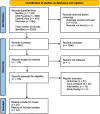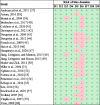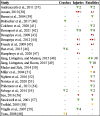The absence of data on driving under the influence of alcohol in road traffic studies: a scoping review of non-randomized studies with vote counting based on the direction of effects of alcohol policies
- PMID: 37507756
- PMCID: PMC10375679
- DOI: 10.1186/s13011-023-00553-y
The absence of data on driving under the influence of alcohol in road traffic studies: a scoping review of non-randomized studies with vote counting based on the direction of effects of alcohol policies
Abstract
Background: Data on driving under the influence of alcohol (DUIA) are not always available, accurate, or reliable, making it difficult to study the effects of alcohol policies on road traffic outcomes. The objectives of our study were twofold: 1) to describe how road traffic outcomes of alcohol policies are assessed when DUIA data are missing, and 2) to explore the effects of alcohol policies when DUIA data are missing.
Methods: We conducted a scoping review of non-randomized studies that assessed the road traffic outcomes of alcohol policies when DUIA data are missing. Until November 2021, we searched studies published between 2000 and 2021, in English or French, via MEDLINE, APA PsycInfo, CINAHL, and SocINDEX. We assessed the risk of bias in the included studies with the Quality Assessment Tool for Before-After (Pre-Post) Studies With No Control Group. The selection process, data extraction, and the risk of bias assessment were conducted independently and in duplicate. We used vote counting based on the direction of the effects of alcohol policies as a synthesis method. The protocol for this review was published in PROSPERO under record number CRD42021266744.
Results: Twenty-four eligible studies were included. Regarding objective 1, most studies used uncontrolled interrupted time series designs to assess road traffic fatalities resulting from night-time crashes. The reasons for missing DUIA data were generally not reported. Regarding objective 2, we found evidence for an association between alcohol policies and decreased road traffic fatalities. Subgroup analyses found no evidence for an association between methodological modifiers and positive effect directions for road traffic fatalities.
Conclusion: Caution is needed when interpreting road traffic outcomes associated with alcohol policies when DUIA data are missing. Greater efforts should be made to improve the reporting of outcomes assessments. Future studies must address several methodological issues (e.g., more granular data, well-defined intervention and implementation, and controlled designs). Our results should be compared to those from others reviews where DUIA data were available to confirm or recalibrate the associations found in studies where DUIA data were missing.
Keywords: Alcohol drinking, Legislation & jurisprudence; Driving under the influence; Non-randomized controlled trials; Systematic review; Traffic accidents.
© 2023. The Author(s).
Conflict of interest statement
None.
Figures



 > 50; medium arrow
> 50; medium arrow
 25-49; small arrow
25-49; small arrow
 < 24. Numbers beside each arrow represent the number of road traffic outcomes summarized, and no number appears in cases where only one outcome was evaluated. In Miller et al. (2004), we classified the actual outcome (severe injuries or fatalities) as fatalities
< 24. Numbers beside each arrow represent the number of road traffic outcomes summarized, and no number appears in cases where only one outcome was evaluated. In Miller et al. (2004), we classified the actual outcome (severe injuries or fatalities) as fatalitiesSimilar articles
-
Blood alcohol concentration in fatally injured drivers and the efficacy of alcohol policies of the new law on road traffic safety: A retrospective 10-year study in autonomous province of Vojvodina, Republic of Serbia.Traffic Inj Prev. 2016 Aug 17;17(6):553-7. doi: 10.1080/15389588.2015.1125479. Epub 2016 Jan 13. Traffic Inj Prev. 2016. PMID: 26761423
-
Deployment of personnel to military operations: impact on mental health and social functioning.Campbell Syst Rev. 2018 Jun 1;14(1):1-127. doi: 10.4073/csr.2018.6. eCollection 2018. Campbell Syst Rev. 2018. PMID: 37131363 Free PMC article.
-
The Association among Alcohol Consumption Patterns, Drink-Driving Behaviors, and the Harm from Alcohol-Related Road Traffic Injuries Due to the Drinking of Others in Thailand.Int J Environ Res Public Health. 2022 Dec 5;19(23):16281. doi: 10.3390/ijerph192316281. Int J Environ Res Public Health. 2022. PMID: 36498361 Free PMC article.
-
Red light camera interventions for reducing traffic violations and traffic crashes: A systematic review.Campbell Syst Rev. 2020 Jun 29;16(2):e1091. doi: 10.1002/cl2.1091. eCollection 2020 Jun. Campbell Syst Rev. 2020. PMID: 37131412 Free PMC article. Review.
-
Interventions to reduce ambient particulate matter air pollution and their effect on health.Cochrane Database Syst Rev. 2019 May 20;5(5):CD010919. doi: 10.1002/14651858.CD010919.pub2. Cochrane Database Syst Rev. 2019. PMID: 31106396 Free PMC article.
References
-
- Vos T, Lim SS, Abbafati C, Abbas KM, Abbasi M, Abbasifard M, et al. Global burden of 369 diseases and injuries in 204 countries and territories, 1990–2019: a systematic analysis for the Global Burden of Disease Study 2019. The Lancet. 2020;396:1204–1222. doi: 10.1016/S0140-6736(20)30925-9. - DOI - PMC - PubMed
-
- Taylor B, Irving HM, Kanteres F, Room R, Borges G, Cherpitel C, et al. The more you drink, the harder you fall: a systematic review and meta-analysis of how acute alcohol consumption and injury or collision risk increase together. Drug Alcohol Depend. 2010;110:108–116. doi: 10.1016/j.drugalcdep.2010.02.011. - DOI - PMC - PubMed
Publication types
MeSH terms
Substances
LinkOut - more resources
Full Text Sources
Medical

